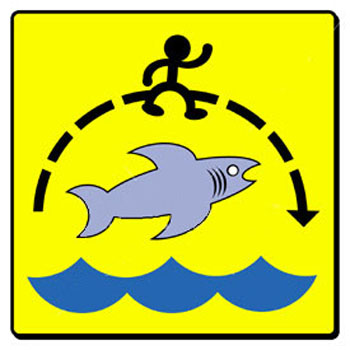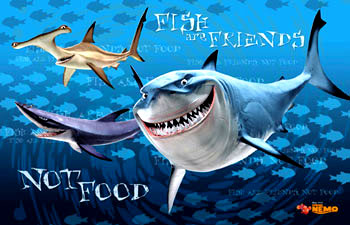Jumping The Sharks of Life
 “In 1987, Jon Hein and his roommates at the University of Michigan were drinking beer and had Nick at Nite playing in the background. They started talking about classic TV shows when someone asked, ‘What was the precise moment you knew it was downhill for your favorite show?’…Sean Connolly offered, ‘That’s easy: It was when Fonzie jumped the shark.’ As Hein later recounted, there was silence in the room: ‘No explanation necessary, the phrase said it all.’” Thus, “Jump the Shark” came to define the moment when a TV show became a parody of itself, lost credibility and should have died with dignity one episode earlier.
“In 1987, Jon Hein and his roommates at the University of Michigan were drinking beer and had Nick at Nite playing in the background. They started talking about classic TV shows when someone asked, ‘What was the precise moment you knew it was downhill for your favorite show?’…Sean Connolly offered, ‘That’s easy: It was when Fonzie jumped the shark.’ As Hein later recounted, there was silence in the room: ‘No explanation necessary, the phrase said it all.’” Thus, “Jump the Shark” came to define the moment when a TV show became a parody of itself, lost credibility and should have died with dignity one episode earlier.
This origin of the phrase “Jump the Shark,” as dubbed by the creators of www.jumptheshark.com, was penned for the Los Angeles Times by none other than Fred Fox, Jr.
Oh. Wait. Who? “If I had been in the room, however, I would have broken that silence of self-assuredness,” Fox asserted, “For I wrote that now infamous episode of Happy Days.”
Oh.
The episode aired on Sept. 20, 1977, and, according to Fox, “was a huge hit, ranking No. 3 for the week…” The writer persisted in his belief that Fonzie performing a water ski jump over a netted shark in a duel against “The California Kid” was a logical choice for an episode since Henry Winkler—the Fonz—water skied and the episode would be the climactic conclusion to a three-part series when Happy Days went to Hollywood. It garnered “a 50-plus share (unheard of today) and an audience of more than 30 million viewers.”
Logically, the Fonz rides motorcycles and has a magic punch that makes broken objects work again. That’s logic, Mr. Fox. The Fonz doesn’t water ski. Especially not in a leather jacket.
However, “More than three decades later, I still don’t believe that the series ‘jumped the shark’ when Fonzie jumped the shark.”
In therapeutic circles, Mr. Fox, we call this denial. I find value in this discussion of the term “Jump the Shark,” and Mr. Fox’s denial of it, because the sharks of life don’t only swim in Happy Days. In fact, they never do.
The true pity of any TV show jumping the shark is that the creators, writers and producers either never saw that their time had passed, or in Mr. Fox’s case, saw it but refused to believe it. We, dear internet, can be smarter than that.
Come, let’s hunt for our own sharks and let’s defeat them rather than jump them.
Working With Sharks
“Fortunately, my career didn’t jump the shark after ‘jump the shark.’ When Happy Days ended, I went directly to the ABC Paramount hit show Webster and, after that, wrote and produced, among others, It’s Your Move, He’s the Mayor, The New Leave It to Beaver and Family Matters. In 1987, Brian Levant and I created the action comedy My Secret Identity, which won an International Emmy.”
 Mr. Fox, we call that rationalization. No, I joke. I’m glad he did well for himself, and I liked Webster and Family Matters. But sharks lurk in our workplaces, and I’m not talking about that guy who thinks he’s God’s gift to the new girl.
Mr. Fox, we call that rationalization. No, I joke. I’m glad he did well for himself, and I liked Webster and Family Matters. But sharks lurk in our workplaces, and I’m not talking about that guy who thinks he’s God’s gift to the new girl.
Patrick Lencioni, in his book, The Three Signs of a Miserable Job has noted that “A miserable job makes a person cynical and frustrated and demoralized when they go home at night. It drains them of their energy, their enthusiasm and self-esteem. Miserable jobs can be found in every industry and at every level.”
Our jobs can jump the shark. I’ve worked at jobs that have jumped the shark. I’m sure you have, too. Things start out awesome; the lights are brighter—or at least not florescent—the boss actually has a sense of humor which functions, the work load is manageable. Then, after a few years, the boss’s sense of humor goes on the blink, and you have no magic punch to fix it. Or the work load goes to ludicrous speed. Many situations can signify that your job has jumped the shark, but the question remains: Will you see the shark before you jump?
Lencioni offered these the three signs of job misery in his book:
Anonymity: Employees feel anonymous when their manager has little interest in them as people with unique lives, aspirations and interests.
Irrelevance: This condition occurs when workers cannot see how their job makes a difference. “Every employee needs to know that the work they do impacts someone’s life—a customer, a coworker, even a supervisor—in one way or another.”
Immeasurement: This term describes the inability of employees to assess for themselves their contributions or success. As a result they often rely on the opinions of others—usually the manager—to measure their success.
If you feel the effects of any of these issues, or all of the lights are replaced with florescent ones (yes, this happened to me) then you best look around for the “California Kid” because your job may have jumped the shark.
Sharks are our Friends
“Fish are friends, not food.”
-Bruce the Shark, Finding Nemo
“It’s easy for casual relationships to be placid,” says Michael P. Nichols, PhD, author of The Lost Art of Listening: How Learning to Listen Can Improve Relationships. “When you start opening up, the potential for conflict inevitably increases.” Dr. Nichols is a wise man, and a fierce shark hunter. Our casual friend relationships will never jump the shark because they lack the personal investment which tends to blind us to negatives.
But a friendship that is real is a friendship that can sour. Here is a list of sour relationship warning signs from my dear friends at Cosmo. Sometimes, when they’re not publishing how-to-manuals for DIY porn starlets or reprinting “Letters to Hustler” columns, they still turn out some interesting and funny stuff.
 • When you and your boyfriend broke up, she stopped by his apartment with fresh-baked chocolate-chip cookies and a shoulder to cry on.
• When you and your boyfriend broke up, she stopped by his apartment with fresh-baked chocolate-chip cookies and a shoulder to cry on.
• She loves your taste in fashion so much that she’s constantly borrowing your clothes…and “forgetting” to give them back.
• Once while drunk, she admitted that she likes to hang with you because she feels skinny in comparison.
• When the lunch check arrives, she says, “Can you get it? I just bought a new Coach purse, so I’m low on cash today.”
• You never make plans with her without having a solid backup option, because you know there is a very good chance that she won’t even show.
• She returns your calls only when she has less than a minute to talk, like she’s about to walk into the bank.
Yes, Cosmopolitan is for women, so these are female oriented. Here, I’ll give you three male oriented ones.
• He makes fun of you when you aren’t around.
• Most of your “hang out” time is spent driving him places he needs to go or to people he needs to see.
• When you and your girlfriend broke up, it was because he was in her bed eating fresh-baked chocolate-chip cookies. And he didn’t even offer you one.
The truth is, friendships do jump the shark, but then they tend to die off naturally. Those friendships that last a life time have found ways to be flexible, weather close seasons and distant seasons without wearying and always rekindle when allowed the space to do so. Friendships that jump the shark become acquaintances.
The Sharks of Love
 “Nowhere in any discussions or articles on the subject of jump the shark did I ever find my name associated with it. So, really, the only people who knew I wrote the episode were those on the show and my friends and family,” Fox said. “But I knew.”
“Nowhere in any discussions or articles on the subject of jump the shark did I ever find my name associated with it. So, really, the only people who knew I wrote the episode were those on the show and my friends and family,” Fox said. “But I knew.”
Anyone who’s relationship has jumped the Shark of Love can relate to Fox. Just like Fox, your close friends, family and deep-down self will see that the relationship has jumped the shark—even if you won’t let yourself notice it or believe it. Let’s face it; one of the worst feelings in the galaxy is that of falling out of love. We deny it, we rationalize it, and we hope that it’s just a season. There are ways to land safely after jumping the shark of love, but one must first see the signs. Then one must act on them.
Anita Naik, health journalist for Netdoctor.com, noted Five Signs You’re in a Dead-End Relationship. Look over the sea of your relationship with the vigilant eye of a shark hunter and notice if you feel that you, or your partner lack respect for each other, have no time for each other, accept (or argue over) incompatible goals, live in boredom or spend most “quality time” bickering and fighting.
The more of those five issues you have, the closer you are to the shark jump. Got all five? You might just find that your relationship has jumped the shark.
Life after the Jump
“This is not a boat accident! And it wasn’t any propeller;
and it wasn’t any coral reef;
and it wasn’t Jack the Ripper! It was a shark.”
-Mr. Hooper (Richard Dreyfuss), Jaws
The connection between relationship death, job death—and TV series death—and jumping the shark is not an inevitable one. “Arguing all the time doesn’t necessarily mean your relationship has hit a dead end,” said relationship counselor Tracey Williams, “it depends on what you’re arguing about and the nature of your fights.”
If you’re constantly bickering about little stuff, but you want to turn things around, then it’s time to look over your relationship together and face your real issues. Chances are there’s a shark jump in your past that you’re really arguing about. Relationships that can face their discord and dissatisfaction with limited defensiveness and the goal of becoming closer and more in love, can live past jumping a shark and reach many happy years of syndication.
The same is true for a job or a friendship. Jumping the shark, if noticed, owned and addressed, can save a series. Look at the final season of Buffy, the Vampire Slayer compared to the previous few. Gilmore Girls ended with a similar high season.
Avoid jumping the shark if you can. If you can’t, then do it with style and say “Ayyy!” Then go and make some changes or find a good spin off. But don’t get me started on Laverne and Shirley.

